You are using an out of date browser. It may not display this or other websites correctly.
You should upgrade or use an alternative browser.
You should upgrade or use an alternative browser.
Toroid
Founding Member
spacecase0
earth human
guess it is time to plant more potatoes
Toroid
Founding Member
nivek
As Above So Below
America's breadline: Thousands of people line up for hours at emergency food banks across the US as unemployment skyrockets amid pandemic
Food banks across America have been inundated by seemingly endless lines of people who have found themselves out of jobs and low on cash as the fight to flatten the coronavirus curve wears on. With the unemployment rate skyrocketing to 14.7 per cent this week - the highest since 1940 - and more than 16.8million people in the US filing for unemployment over the last three weeks, food banks have been struggling to keep up with unprecedented demand. The growing pull on these emergency food pantries comes just as families across the country are heading into major religious holidays Passover and Easter.
Long lines were spotted in cities across the country, from New York City to Boston and Santa Ana, California Saturday. On Saturday, Second Harvest Food Bank of Orange County hosted a drive-thru food distribution in Anaheim, California, meant to provide food to people most affected by the coronavirus pandemic. The three-hour event was stocked with enough food for up to 7,000 families, with each car in the line being given a bag each of potatoes, onions, shelf-stable grocery items and King's Hawaiian Bread, KTLA reported.
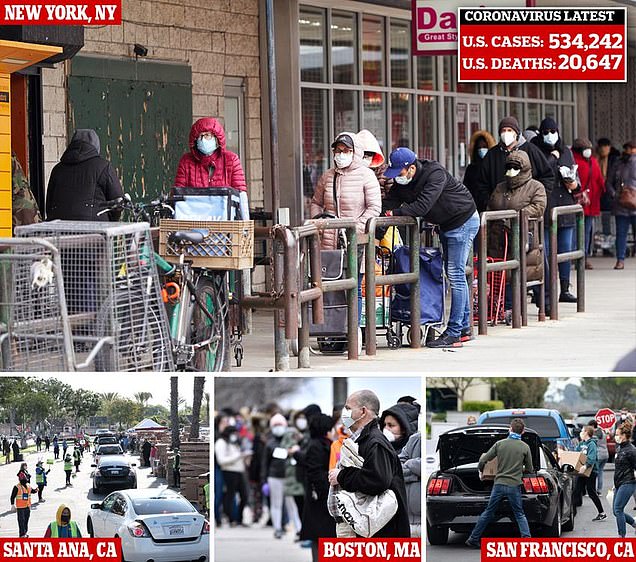
Food banks across America have been inundated by seemingly endless lines of people who have found themselves out of jobs and low on cash as the fight to flatten the coronavirus curve wears on. With the unemployment rate skyrocketing to 14.7 per cent this week - the highest since 1940 - and more than 16.8million people in the US filing for unemployment over the last three weeks, food banks have been struggling to keep up with unprecedented demand. The growing pull on these emergency food pantries comes just as families across the country are heading into major religious holidays Passover and Easter.
Long lines were spotted in cities across the country, from New York City to Boston and Santa Ana, California Saturday. On Saturday, Second Harvest Food Bank of Orange County hosted a drive-thru food distribution in Anaheim, California, meant to provide food to people most affected by the coronavirus pandemic. The three-hour event was stocked with enough food for up to 7,000 families, with each car in the line being given a bag each of potatoes, onions, shelf-stable grocery items and King's Hawaiian Bread, KTLA reported.

nivek
As Above So Below
One of the largest pork processing facilities in the US is closing until further notice
One of the country's largest pork processing facilities is closing until further notice as employees fall ill with Covid-19.
The closure puts the country's meat supply at risk, said the CEO of Smithfield, which operates the plant.
"The closure of this facility, combined with a growing list of other protein plants that have shuttered across our industry, is pushing our country perilously close to the edge in terms of our meat supply," the meat processor's chief executive, Kenneth Sullivan, said in a statement Sunday. "It is impossible to keep our grocery stores stocked if our plants are not running," he said. "These facility closures will also have severe, perhaps disastrous, repercussions for many in the supply chain."
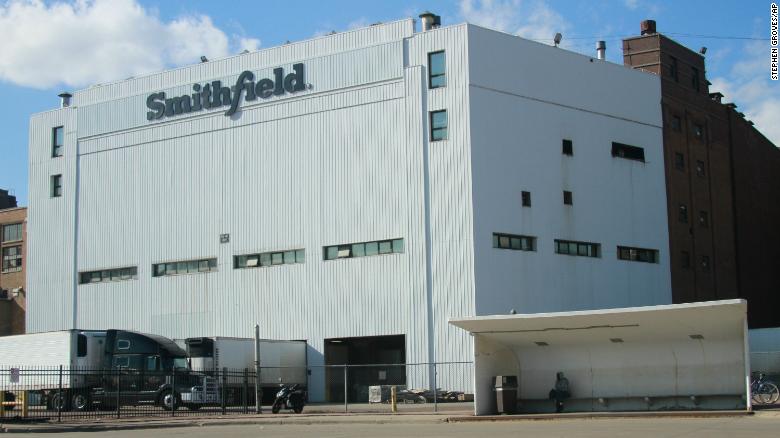
The Sioux Falls, South Dakota, facility accounts for 4% to 5% of the country's pork production and employs about 3,700 people, according to Smithfield. South Dakota Gov. Kristi Noem said during a Saturday news briefing that Smithfield employees accounted for more than half of the active coronavirus cases in the state. About 240 employees are sick, she said, out of roughly 430 active cases in the state. Because of that, she and the mayor of Sioux Falls recommended that Smithfield suspend operations for at least two weeks.
The problem extends beyond South Dakota. Meat processors in Iowa and Pennsylvania have also shut their doors because of sick employees. Smithfield will maintain some activity in the plant on Tuesday to process its inventory, the company said, as it prepares to fully shut down, adding that it will compensate employees for the next two weeks.
.
One of the country's largest pork processing facilities is closing until further notice as employees fall ill with Covid-19.
The closure puts the country's meat supply at risk, said the CEO of Smithfield, which operates the plant.
"The closure of this facility, combined with a growing list of other protein plants that have shuttered across our industry, is pushing our country perilously close to the edge in terms of our meat supply," the meat processor's chief executive, Kenneth Sullivan, said in a statement Sunday. "It is impossible to keep our grocery stores stocked if our plants are not running," he said. "These facility closures will also have severe, perhaps disastrous, repercussions for many in the supply chain."

The Sioux Falls, South Dakota, facility accounts for 4% to 5% of the country's pork production and employs about 3,700 people, according to Smithfield. South Dakota Gov. Kristi Noem said during a Saturday news briefing that Smithfield employees accounted for more than half of the active coronavirus cases in the state. About 240 employees are sick, she said, out of roughly 430 active cases in the state. Because of that, she and the mayor of Sioux Falls recommended that Smithfield suspend operations for at least two weeks.
The problem extends beyond South Dakota. Meat processors in Iowa and Pennsylvania have also shut their doors because of sick employees. Smithfield will maintain some activity in the plant on Tuesday to process its inventory, the company said, as it prepares to fully shut down, adding that it will compensate employees for the next two weeks.
.
nivek
As Above So Below
US farmers dump 3.7 million gallons of milk every day and plow fresh vegetables back into the soil because restaurants, hotels and schools have closed due to the coronavirus
Farmers are dumping milk and plowing crops back into the soil during the coronavirus outbreak as many have seen a drop in business after the closings of restaurants, hotels and schools in response to the pandemic. As a result, farmers are dumping 3.7 million gallons of milk daily, as a single chicken processor smashes 750,000 eggs per week, reports Dairy Farmers of America, the largest dairy farm cooperative in the country.
The International Dairy Foods Association also estimates that about 5 per cent of the milk supply in the U.S. is now being dumped because of the fallout on business from the virus. Farmers also are being forced to bury fresh vegetables, or in some cases, donate them to organizations like Meals on Wheels, which provide food to those in need. Limited resources, however, make it difficult for the farmers to provide the donations, as well as repackage products that are in demand with customers they normally don't sell to.
.
Farmers are dumping milk and plowing crops back into the soil during the coronavirus outbreak as many have seen a drop in business after the closings of restaurants, hotels and schools in response to the pandemic. As a result, farmers are dumping 3.7 million gallons of milk daily, as a single chicken processor smashes 750,000 eggs per week, reports Dairy Farmers of America, the largest dairy farm cooperative in the country.
The International Dairy Foods Association also estimates that about 5 per cent of the milk supply in the U.S. is now being dumped because of the fallout on business from the virus. Farmers also are being forced to bury fresh vegetables, or in some cases, donate them to organizations like Meals on Wheels, which provide food to those in need. Limited resources, however, make it difficult for the farmers to provide the donations, as well as repackage products that are in demand with customers they normally don't sell to.
.
nivek
As Above So Below
Delaware meat company is forced to kill and dump two million chickens due to plant staff calling out sick
Delaware chicken meat company Allen Harim is being forced to kill up to two million chickens without selling their meat as coronavirus illnesses have brought plant staff down to 50 percent.
.
Delaware chicken meat company Allen Harim is being forced to kill up to two million chickens without selling their meat as coronavirus illnesses have brought plant staff down to 50 percent.
.
nivek
As Above So Below
Farming association warns 'food will rot in the fields' unless 80,000 farm labour vacancies are filled - as chartered flight of around 180 Romanian fruit pickers is due to land at Stansted tomorrow
British crops may 'rot in the fields' unless 80,000 farm workers are found, a farming association has warned - with a private charter plane of 180 Romanian fruit pickers due to land at Stansted airport tomorrow to tackle the shortages.
The stark warning comes after producers issued a nationwide appeal for Brits join a new 'Land Army' of farm workers to pick fruit and vegetables amid the coronavirus lockdown. So far, more than 32,000 people have signed up - but only around 4,000 have actually opted to interview for a role.
Around 80,000 workers are required every summer to work the fields, with British farmers usually being able to call on seasonal workers from Europe. However, with the coronavirus pandemic stopping commercial flights and causing lockdowns all over the continent, farmers have appealed to Brits, many furloughed and not currently working, to fill the gap. But some farmers are still struggling, prompting one Lincolnshire-based food producer to charter a private plane of 180 Romanian fruit pickers, which gets into Stansted tomorrow. They will then be taken to Lincolnshire by bus, with the flight believed to be just the first of six.
The Country Land & Business Association has admitted the number of British volunteers is still not enough, with a spokesman telling Mail Online that they wouldn't be surprised if more foreign workers are flown in to avoid food 'rotting in the fields'.
(more on the link)
.
British crops may 'rot in the fields' unless 80,000 farm workers are found, a farming association has warned - with a private charter plane of 180 Romanian fruit pickers due to land at Stansted airport tomorrow to tackle the shortages.
The stark warning comes after producers issued a nationwide appeal for Brits join a new 'Land Army' of farm workers to pick fruit and vegetables amid the coronavirus lockdown. So far, more than 32,000 people have signed up - but only around 4,000 have actually opted to interview for a role.
Around 80,000 workers are required every summer to work the fields, with British farmers usually being able to call on seasonal workers from Europe. However, with the coronavirus pandemic stopping commercial flights and causing lockdowns all over the continent, farmers have appealed to Brits, many furloughed and not currently working, to fill the gap. But some farmers are still struggling, prompting one Lincolnshire-based food producer to charter a private plane of 180 Romanian fruit pickers, which gets into Stansted tomorrow. They will then be taken to Lincolnshire by bus, with the flight believed to be just the first of six.
The Country Land & Business Association has admitted the number of British volunteers is still not enough, with a spokesman telling Mail Online that they wouldn't be surprised if more foreign workers are flown in to avoid food 'rotting in the fields'.
(more on the link)
.
nivek
As Above So Below
Tale of two Americas: Mile-long line of cars for a food bank snakes through a parking lot between two luxury Miami Beach hotels as need for help with groceries grows across the nation

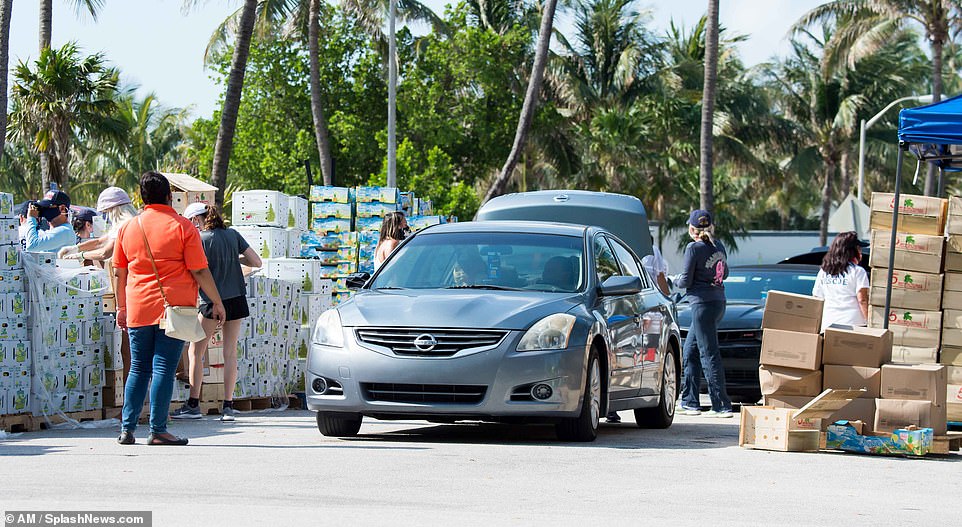
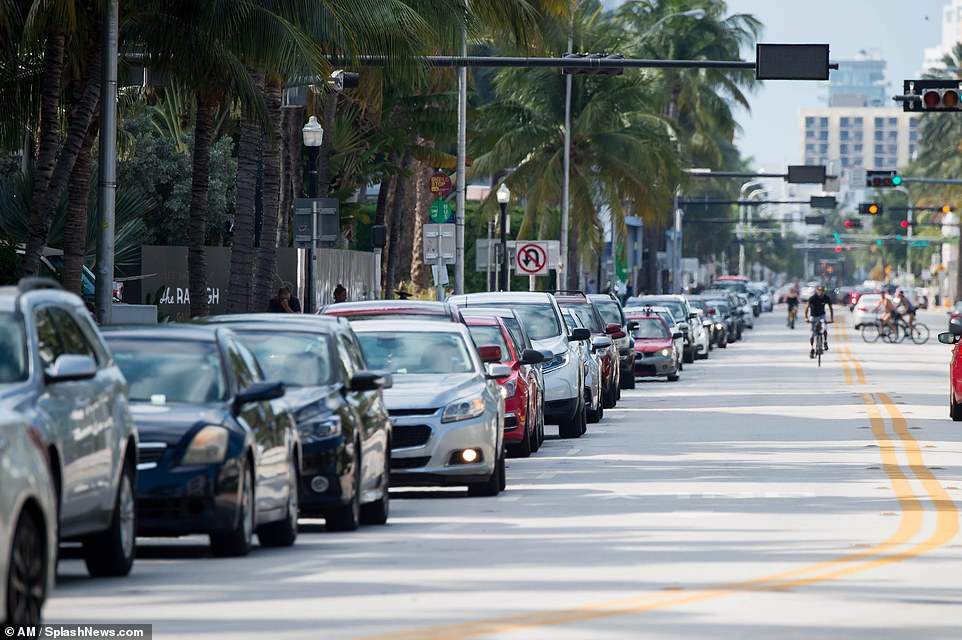

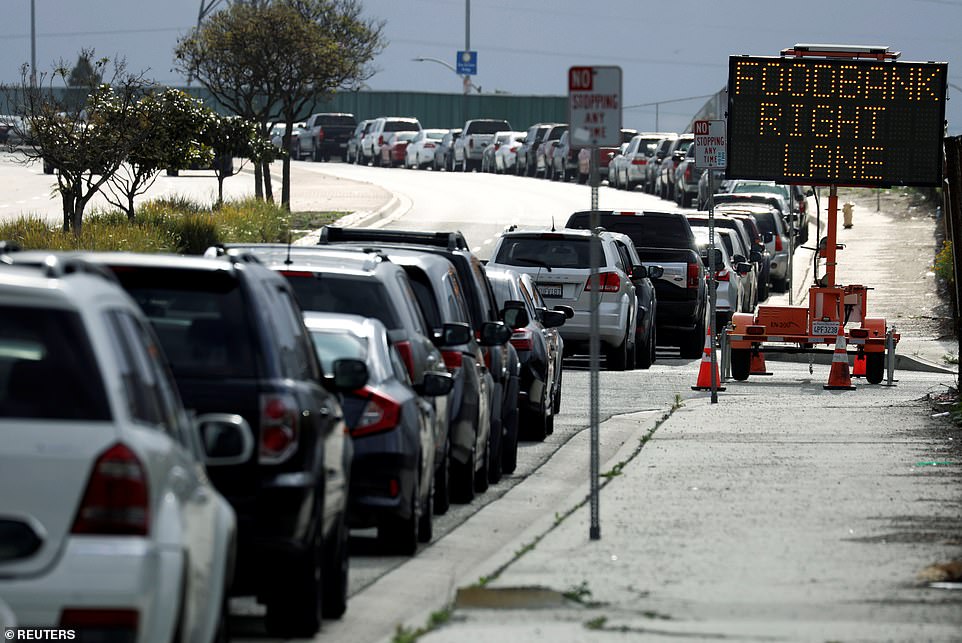
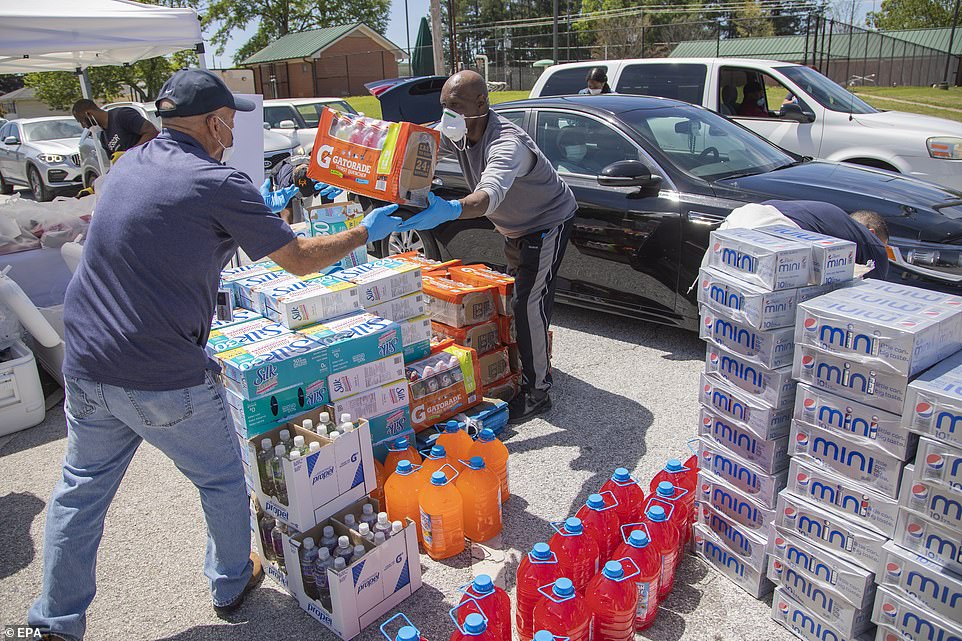
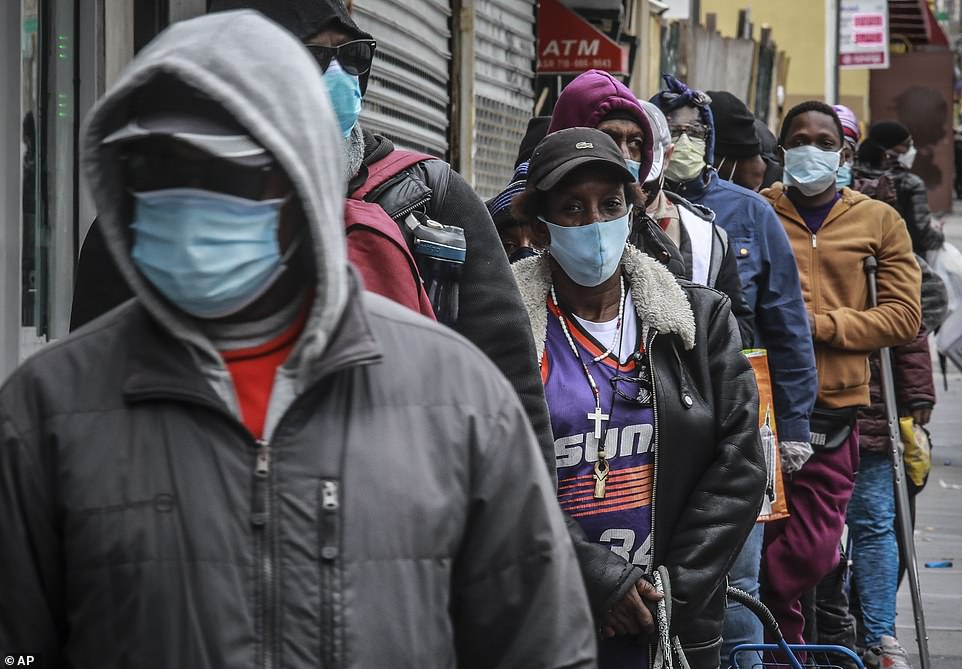
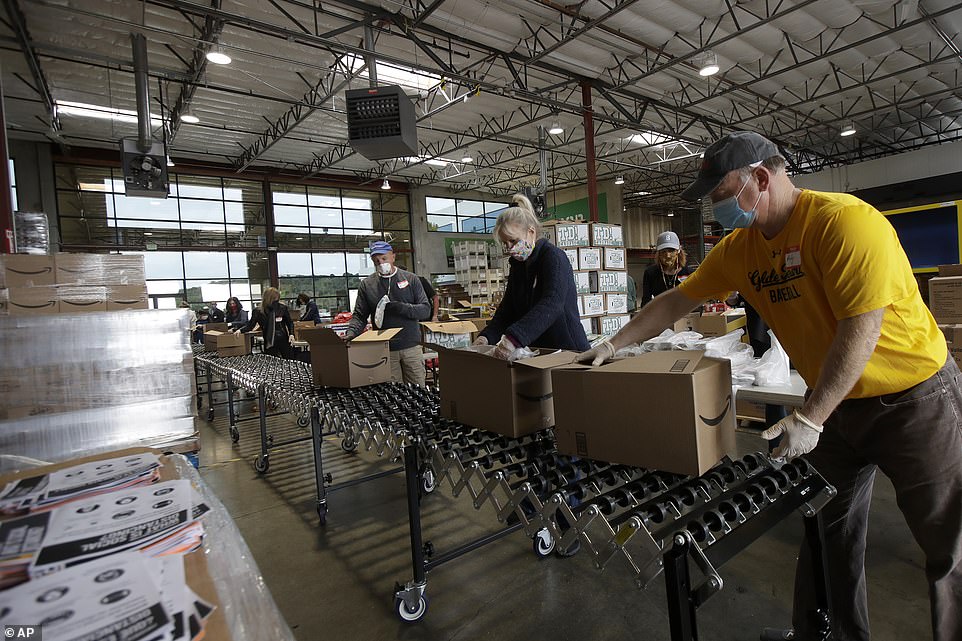
- Floridian motorists lined up for hours to receive food in a parking lot sandwiched between luxury hotels
- A food bank was distributing food inside a lot between the W and Setai Hotels in Miami Beach on Saturday
- Elsewhere, long lines of cars were seen outside food distribution sites near Los Angeles and San Francisco
- Near Atlanta, local residents waited to receive food from a food bank in College Park, Georgia
- The Reverend Al Sharpton distributed food and masks to New Yorkers in the Harlem section of Manhattan








nivek
As Above So Below
Meat plants are now coronavirus hotspots: Illnesses spiked as companies kept employees working so they could maintain food supplies
Workers at major meat processing plants across the US said they were told to keep working in crowded situations, sometimes while sick, while their companies failed to provide adequate protective gear, turning the plants into coronavirus infection hot spots, a new investigation reveals.
Since the coronavirus outbreak in the US, government officials have praised the meat industry for its efforts to ensure there aren't interruptions in the national food supply.
The claims come in the wake of 15 closures of processing plants owned by Tyson Foods, JBS USA and Smithfield - three of the country's biggest major meat producers - following reports of hundreds of confirmed coronavirus cases amongst workers over the last few weeks.
At least 31 processing plants owned by the three companies have had coronavirus outbreaks, the Washington Post reported. Workers at the plants have blamed the high number of infections on the companies' corporate policies.
They claimed that they were not given personal protective equipment or required to wear them for weeks after coronavirus infection rates starts skyrocketing in the US. JBS USA told the newspaper that it didn't receive masks for workers until April 2, but didn't make their use mandatory until April 13.
Tyson, meanwhile, said that they didn't require all workers to wear masks until April 15.
Smithfield did not reveal when they began providing masks to workers, but said that they were made available to them. Workers at some Smithfield plants said that this only occurred one or two weeks ago.
All three companies said that they have been working to protect their workers from catching and spreading coronavirus. They said they had increased sanitation and social distancing measures, as well as checking temperatures of the workers before their shifts started.
They also said that they now required quarantine for workers with positive coronavirus results and those who had been in close contact with them.
.
Workers at major meat processing plants across the US said they were told to keep working in crowded situations, sometimes while sick, while their companies failed to provide adequate protective gear, turning the plants into coronavirus infection hot spots, a new investigation reveals.
Since the coronavirus outbreak in the US, government officials have praised the meat industry for its efforts to ensure there aren't interruptions in the national food supply.
The claims come in the wake of 15 closures of processing plants owned by Tyson Foods, JBS USA and Smithfield - three of the country's biggest major meat producers - following reports of hundreds of confirmed coronavirus cases amongst workers over the last few weeks.
At least 31 processing plants owned by the three companies have had coronavirus outbreaks, the Washington Post reported. Workers at the plants have blamed the high number of infections on the companies' corporate policies.
They claimed that they were not given personal protective equipment or required to wear them for weeks after coronavirus infection rates starts skyrocketing in the US. JBS USA told the newspaper that it didn't receive masks for workers until April 2, but didn't make their use mandatory until April 13.
Tyson, meanwhile, said that they didn't require all workers to wear masks until April 15.
Smithfield did not reveal when they began providing masks to workers, but said that they were made available to them. Workers at some Smithfield plants said that this only occurred one or two weeks ago.
All three companies said that they have been working to protect their workers from catching and spreading coronavirus. They said they had increased sanitation and social distancing measures, as well as checking temperatures of the workers before their shifts started.
They also said that they now required quarantine for workers with positive coronavirus results and those who had been in close contact with them.
.
Toroid
Founding Member
Toroid
Founding Member
www.youtube.com/watch?v=ykfATAQJL9Y
Published on May 12, 2020
In contrast, food indexes rose in April, with the index for food at home posting its largest monthly increase since February 1974.
Learn More:
https://www.zerohedge.com/markets/cor...
nivek
As Above So Below
nivek
As Above So Below
Food prices are soaring faster than inflation and incomes and the timing couldn’t be worse
In Indonesia, tofu is 30% more expensive than it was in December. In Brazil, the price of local mainstay turtle beans is up 54% compared to last January. In Russia, consumers are paying 61% more for sugar than a year ago.
Emerging markets are feeling the pain of a blistering surge in raw material costs, as commodities from oil to copper and grains are driven higher by expectations for a “roaring 20s” post-pandemic economic recovery as well as ultra-loose monetary policies.
Consumers in the U.S., Canada and Europe won’t be immune either as companies — already under pressure from pandemic-related disruptions and rising transport and packaging costs — run out of ways to absorb the surge.
“People will have to get used to paying more for food,” said Sylvain Charlebois, director of the Agri-Food Analytics Lab at Dalhousie University in Canada. “It’s only going to get worse.”
While never welcome, the coming round of food inflation will be especially tough. As the pandemic wrought havoc on the global economy, it ushered in new concerns about hunger and malnutrition, even in the world’s wealthiest countries.
In the U.K., the Trussell Trust gave out a record 2,600 food parcels a day to children in the first six months of the pandemic. In the U.S., the Covid-19 crisis pushed an additional 13.2 million people into food insecurity, a 35% jump from 2018, according to estimates from Feeding America, the nation’s largest hunger-relief organization.
In the U.S., prices rose close to 3% in the year ending Jan. 2, according to NielsenIQ, roughly double the overall rate of inflation. That small jump adds up, particularly for families already near the edge. The poorest Americans already spend 36% of their income on food, according to the U.S. Department of Agriculture, and mass layoffs in lower-wage work like retail and transportation have increased the strain on household budgets.
Meanwhile, the price of staples like grains, sunflower seeds, soybeans and sugar have soared, pushing global food prices to a fresh six-year high in January. They’re not likely to fall any time soon, thanks to a combination of poor weather, increased demand and virus-mangled global supply chains.
Developed markets tend to be insulated from short-term price spikes, because food is more processed and the food chain is more elaborate. In the process of turning a bushel of corn into a bag of Tostitos, food companies have a lot of room to absorb incremental costs, said David Ubilava, a senior lecturer at the University of Sydney who specializes in agricultural economics. But when costs stay high for a sustained period of time, companies start thinking about how to pass them on.
“We are experiencing inflation right now as is everybody else,” Conagra Brands Inc. Chief Executive Officer Sean Connolly said in an interview. Costs are up for oils, pork and eggs, plus packaging materials like cardboard and steel. The company, parent to more than 70 brands including Birds Eye, Chef Boyardee, and Udi’s Gluten-Free, says raising prices is one of the levers it could pull this year to counter rising costs.
General Mills, the maker of Cheerios, Yoplait and and Blue Buffalo pet food, is also looking at price increases, said Jon Nudi, who leads the North American retail division, at least “in the areas we see significant inflation.” Dave Ciesinski, Chief Executive Officer of Lancaster Colony Corp., which makes the Marzetti brand and others, said they anticipate a sustained period of rising costs. The company is going to have to figure out how to “justifiably or appropriately pass on these costs,” he told analysts in an earnings call.
Even the cost of white label goods — also known as house brands — is likely to go up, notably in the second half of the year, said Steven Oakland, CEO of Treehouse Foods, which makes products for grocery stores to sell under their own brand names. “We’re working very closely to decide what can we mitigate,” he said. “What do we need to pass on? What’s the right movement with the consumer?”
(More on the link)
.

 oE
oE